I am trying to figure out how to make a query in LINQ where some values are nullable.
Next is my table:
ID int
Key1 int
Key2 int?
Key3 int?
Value string
uniq = Key1+Key2+Key3+Value
Now I need to check if an existing record is there already base on a unique constraint.
I tried the following:
Object tmp = model.table.FirstOrDefault(row => row.Key1 == newItem.Key1 &&
(row.Key2.HasValue && newItem.Key2.HasValue && row.Key2.Value == newItem.Key2.Value) &&
(row.Key3.HasValue && newItem.Key3.HasValue && row.Key3.Value == newItem.Key3.Value) &&
row.Value == newItem.Value);
and:
Object tmp = model.table.FirstOrDefault(row => row.Key1 == newItem.Key1 &&
row.Key2 == newItem.Key2 &&
row.Key3 == newItem.Key3 &&
row.Value == newItem.Value);
But both didn't get me correct results when one of the keys is null!
Is there a way to write a correct LINQ query?
